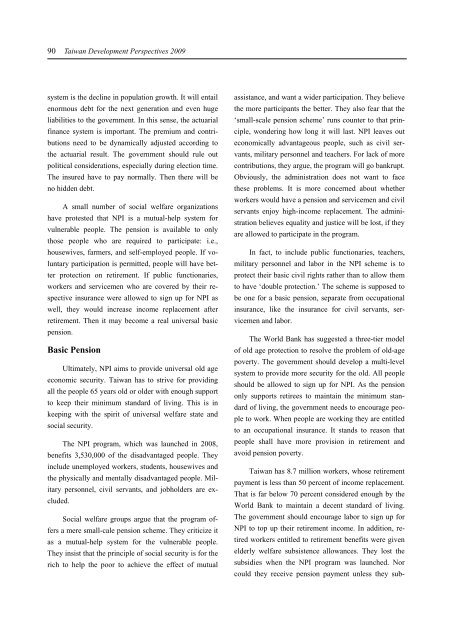PDF(2.7mb) - 國家政策研究基金會
PDF(2.7mb) - 國家政策研究基金會
PDF(2.7mb) - 國家政策研究基金會
Create successful ePaper yourself
Turn your PDF publications into a flip-book with our unique Google optimized e-Paper software.
90 Taiwan Development Perspectives 2009<br />
system is the decline in population growth. It will entail<br />
enormous debt for the next generation and even huge<br />
liabilities to the government. In this sense, the actuarial<br />
finance system is important. The premium and contributions<br />
need to be dynamically adjusted according to<br />
the actuarial result. The government should rule out<br />
political considerations, especially during election time.<br />
The insured have to pay normally. Then there will be<br />
no hidden debt.<br />
A small number of social welfare organizations<br />
have protested that NPI is a mutual-help system for<br />
vulnerable people. The pension is available to only<br />
those people who are required to participate: i.e.,<br />
housewives, farmers, and self-employed people. If voluntary<br />
participation is permitted, people will have better<br />
protection on retirement. If public functionaries,<br />
workers and servicemen who are covered by their respective<br />
insurance were allowed to sign up for NPI as<br />
well, they would increase income replacement after<br />
retirement. Then it may become a real universal basic<br />
pension.<br />
Basic Pension<br />
Ultimately, NPI aims to provide universal old age<br />
economic security. Taiwan has to strive for providing<br />
all the people 65 years old or older with enough support<br />
to keep their minimum standard of living. This is in<br />
keeping with the spirit of universal welfare state and<br />
social security.<br />
The NPI program, which was launched in 2008,<br />
benefits 3,530,000 of the disadvantaged people. They<br />
include unemployed workers, students, housewives and<br />
the physically and mentally disadvantaged people. Military<br />
personnel, civil servants, and jobholders are excluded.<br />
Social welfare groups argue that the program offers<br />
a mere small-cale pension scheme. They criticize it<br />
as a mutual-help system for the vulnerable people.<br />
They insist that the principle of social security is for the<br />
rich to help the poor to achieve the effect of mutual<br />
assistance, and want a wider participation. They believe<br />
the more participants the better. They also fear that the<br />
‘small-scale pension scheme’ runs counter to that principle,<br />
wondering how long it will last. NPI leaves out<br />
economically advantageous people, such as civil servants,<br />
military personnel and teachers. For lack of more<br />
contributions, they argue, the program will go bankrupt.<br />
Obviously, the administration does not want to face<br />
these problems. It is more concerned about whether<br />
workers would have a pension and servicemen and civil<br />
servants enjoy high-income replacement. The administration<br />
believes equality and justice will be lost, if they<br />
are allowed to participate in the program.<br />
In fact, to include public functionaries, teachers,<br />
military personnel and labor in the NPI scheme is to<br />
protect their basic civil rights rather than to allow them<br />
to have ‘double protection.’ The scheme is supposed to<br />
be one for a basic pension, separate from occupational<br />
insurance, like the insurance for civil servants, servicemen<br />
and labor.<br />
The World Bank has suggested a three-tier model<br />
of old age protection to resolve the problem of old-age<br />
poverty. The government should develop a multi-level<br />
system to provide more security for the old. All people<br />
should be allowed to sign up for NPI. As the pension<br />
only supports retirees to maintain the minimum standard<br />
of living, the government needs to encourage people<br />
to work. When people are working they are entitled<br />
to an occupational insurance. It stands to reason that<br />
people shall have more provision in retirement and<br />
avoid pension poverty.<br />
Taiwan has 8.7 million workers, whose retirement<br />
payment is less than 50 percent of income replacement.<br />
That is far below 70 percent considered enough by the<br />
World Bank to maintain a decent standard of living.<br />
The government should encourage labor to sign up for<br />
NPI to top up their retirement income. In addition, retired<br />
workers entitled to retirement benefits were given<br />
elderly welfare subsistence allowances. They lost the<br />
subsidies when the NPI program was launched. Nor<br />
could they receive pension payment unless they sub-

















